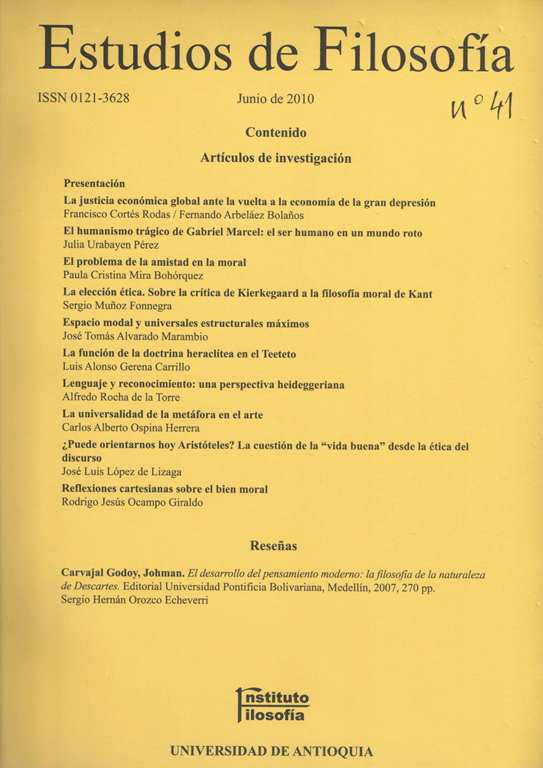Language and acknowledgment: a heideggerian perspective
DOI:
https://doi.org/10.17533/udea.ef.11608Keywords:
Ge-Stell, Ereignis, nearness, mutual belonging, identity - difference, to approach - to correspond, selfness, “Vorausahnung”Abstract
The thesis of this article expounds that Heideggerian Philosophy enables a meditation on the experience of the acknowledgment of the other. After questioning some of the criticisms directed to Heidegger due to his emphasis on the ontological scope, the sense of the concept of acknowledgment concept and its nexus with the notion of nearness is approached, to end up with the identification of nearness with language. This identfication will give to the experience of acknowledgment its ontic-ontological character that will allow the understanding of its "essence". The question on the condition of possibility of acknowledgment will lead to the concept of "Vorausahnung", not treated by Heidegger but made possible by his philosophizing. It concludes with the conception of acknowledgment as a structural condition of human existence.
Downloads
References
BIEMEL, Walter (1973) Martin Heidegger in Selbstzeugnissen und Bilddokumenten. Reinbek, Rowohlt.
BORST, Eva (2003) Anerkennung der Anderen und das Problem des Unterschieds. Baltmannsweiler, Schneider.
Das Herkunftswörterbuch (1963) Die Etymologie der deutschen Sprache. Mannheim, Dudenverlag.
GADAMER, Hans-Georg (1993) Hermeneutik II. Gesammelte Werke 2. Tübingen: J. C. B. Mohr, 1993.
GADAMER, Hans-Georg (1995) Hermeneutik im Rückblick. Gesammelte Werke 10. Tübingen, J. C. B. Mohr.
GEHLEN, Arnold (1975) Die Seele im technischen Zeitalter. Sozialpsychologische Probleme in der industriellen Gesellschaft. Reinbeck bei Hamburg, Rowohlt.
GUZZONI, Ute (ed.) (1980) Nachdenken über Heidegger. Eine Bestandsaufnahme. Hildesheim, Gerstenberg.
HABERMAS, Jürgen (1985) Der philosophische Diskurs der Moderne. Frankfurt am Main, Suhrkamp.
HABERMAS, Jürgen (2006) Vorstudien und Ergänzungen zur Theorie des kommunikativen Handelns. Frankfurt am Main, Suhrkamp.
HAFENEGER, Benno; HENKENBORG, Peter und SCHERR, Albert (Hrsg.) (2002) Pädagogik der Anerkennung. Grundlagen, Konzepte, Praxisfelder. Schwalbach/T, Wochenschau.
HEIDEGGER, Martin (1981) Erläuterungen zu Hölderlins Dichtung (GA 4), editado por Friedrich-Wilhelm von Herrmann. Frankfurt am Main, Vittorio Klostermann.
HEIDEGGER, Martin (1977) Holzwege (GA 5), editado por Friedrich- Wilhelm von Herrmann. Frankfurt am Main, Vittorio Klostermann.
HEIDEGGER, Martin (2000) Vorträge und Aufsätze (GA 7), editado por Friedrich-Wilhelm von Herrmann. Frankfurt am Main, Vittorio Klostermann.
HEIDEGGER, Martin(1976). Wegmarken (GA9), editado por Friedrich-Wilhelm von Herrmann. Frankfurt am Main, Vittorio Klostermann.
HEIDEGGER, Martin (1997) Der Satz vom Grund (GA 10), editado por Petra Jaeger. Frankfurt am Main, Vittorio Klostermann.
HEIDEGGER, Martin (1983) Aus der Erfahrung des Denkens (GA 13), editado por Hermann Heidegger. Frankfurt am Main, Vittorio Klostermann.
HEIDEGGER, Martin (1994). Bremerund Freiburger Vorträge (GA79), editado por Petra Jaeger. Frankfurt am Main, Vittorio Klostermann.
HEIDEGGER, Martin (1959) Gelassenheit (Ge). Pfullingen, Neske.
HEIDEGGER, Martin (1990) Identidad y diferencia (IuD). Barcelona, Anthropos.
HEIDEGGER, Martin (1997) Unterwegs zur Sprache (UzS). Stuttgart, Neske.
HEIDEGGER, Martin (1969) “Zeit und Sein”, Zur Sache des Denkens. Tübingen, Niemeyer.
KETTERING, Emil (1987) Nähe. Das Denken Martin Heideggers. Pfullingen, Neske.
KOBAYASHI, Nobuyuki (2003) Heidegger und die Kunst. Köln, Chôra, 2003.
MARCUSE, Herbert (1970) Der eindimensionale Mensch. Studien zur Ideologie der fortgeschrittenen Industriegesellschaft. Neuwied und Berlin, Hermann Luchterhand.
ROCHA DE LA TORRE, Alfredo (2005) “El lenguaje como apertura y 'apropiación' de mundo en la filosofía de Martin Heidegger”, en: Escritos de Filosofía, Buenos Aires, No. 45, pp. 201-230.
ROCHA DE LA TORRE, Alfredo. (2007a) “El concepto de cercanía en Martin Heidegger”, en: Revista Devenires, Morelia, México, No. 15, 2007, pp. 88-125.
ROCHA DE LA TORRE, Alfredo. (2007b) “Die Sprache als Haus des Seins. Die Überwindung der räumlichen Auffassung des Wohnens”, en: Cosmus, Oliver y Kurbacher, Frauke, eds. Denkspuren. Festschrift für Heinrich Hüni. Würzburg, Königshausen und Neumann, 2007.
RORTY, Richard (1991) “Wittgenstein, Heidegger und die Hypostasierung der Sprache”, en McGuinness, Brian, ed. Der Löwe spricht... und wir können ihn nicht verstehen. Frankfurt am Main, Suhrkamp.
SEELAND, Klaus (1998) Interkultureller Vergleich: Eine Theorie der Weltaneignung nach Heidegger. Würzburg, Königshausen & Neumann.
TUGENDHAT, Ernst (1994) “La pregunta heideggeriana por el ser”, en: Ideas y Valores, Bogotá, No. 95, pp. 5-28.
WISSER, Richard (1970) ed. Martin Heidegger im Gespräch. Freiburg/ München: Alber.
WISSER, Richard (1977) “Das Fernseh-Interview”, en: Neske, Günther, ed. Erinnerung an Martin Heidegger. Pfullingen, Neske.
Downloads
Published
How to Cite
Issue
Section
Categories
License
Copyright (c) 2010 Alfredo Rocha de la Torre

This work is licensed under a Creative Commons Attribution-NonCommercial-ShareAlike 4.0 International License.
Authors who publish with this journal agree to the following terms:
1. The Author retains copyright in the Work, where the term "Work" shall include all digital objects that may result in subsequent electronic publication or distribution.
2. Upon acceptance of the Work, the author shall grant to the Publisher the right of first publication of the Work.
3. The Author shall grant to the Publisher a nonexclusive perpetual right and license to publish, archive, and make accessible the Work in whole or in part in all forms of media now or hereafter known under a Creative Commons Attribution-NoCommercia-ShareAlike (CC BY-NC-SA 4.0), or its equivalent, which, for the avoidance of doubt, allows others to copy, distribute, and transmit the Work under the following conditions: (a) Attribution: Other users must attribute the Work in the manner specified by the author as indicated on the journal Web site;(b) Noncommercial: Other users (including Publisher) may not use this Work for commercial purposes;
4. The Author is able to enter into separate, additional contractual arrangements for the nonexclusive distribution of the journal's published version of the Work (e.g., post it to an institutional repository or publish it in a book), as long as there is provided in the document an acknowledgement of its initial publication in this journal;
5. Authors are permitted, and Estudios de Filosofía promotes, to post online the preprint manuscript of the Work in institutional repositories or on their Websites prior to and during the submission process, as it can lead to productive exchanges, as well as earlier and greater citation of published work (see The Effect of Open Access). Any such posting made before acceptance and publication of the Work is expected be updated upon publication to include a reference to the Estudios de Filosofía's assigned URL to the Article and its final published version in Estudios de Filosofía.















